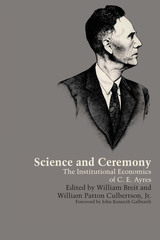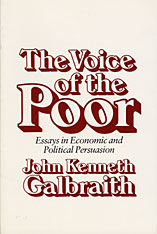
A unique document in the history of the Kennedy years, these letters give us a firsthand look at the working relationship between a president and one of his close advisers, John Kenneth Galbraith. In an early letter, Galbraith mentions his "ambition to be the most reticent adviser in modern political history." But as a respected intellectual and author of the celebrated The Affluent Society, he was not to be positioned so lightly, and his letters are replete with valuable advice about economics, public policy, and the federal bureaucracy. As the United States' ambassador to India from 1961 to 1963, Galbraith made use of his position to counsel the President on foreign policy, especially as it bore on the Asian subcontinent and, ultimately, Vietnam.
Written with verve and wit, his letters were relished by a president who had little patience for foolish ideas or bad prose. They stand out today as a vibrant chronicle of some of the most subtle and critical moments in the days of the Kennedy administration--and a fascinating record of the counsel that Galbraith offered President Kennedy. Ranging from a pithy commentary on Kennedy's speech accepting the 1960 Democratic presidential nomination (and inaugurating the "New Frontier") to reflections on critical matters of state such as the Cuban Missile Crisis and the threat of Communism in Indochina, Letters to Kennedypresents a rare, intimate picture of the lives and minds of a political intellectual and an intellectual politician during a particularly bright moment in American history.


Clarence Edwin Ayres was the leading American institutionalist economist in the post–World War II era. His innovative theories concerning the causes and significance of technological change provided the philosophical framework for that school of economics called institutionalism. In his recognition that the critical economic issues of the future would be the realization of the full economic potential of industrial society and the development of the third world, he was at least twenty years ahead of his time. In addition, Ayres's influence as an economics teacher at the University of Texas at Austin went well beyond the discipline of economics to students of anthropology, psychology, philosophy, education, and even music and art.
This book constitutes the first major appraisal of the work and influence of C. E. Ayres. The essays are written from a transatlantic as well as a national viewpoint and do not evince anyone ideological bias. As John Kenneth Galbraith says in his Foreword, the essays are not meant as a monument to Ayres; instead, they critique what he thought and did, showing "his range of interests, his diligence, his originality of mind and method."
Contributions to the volume are "Clarence Edwin Ayres: An Intellectual's Portrait" by editors William Breit and William Patton Culbertson, Jr.; "Clarence Ayres's Place in the History of American Economics: An Interim Assessment" by A. W. Coats; "C. E. Ayres on the Industrial Revolution" by R. M. Hartwell; "Clarence Ayres and the Roots of Economic Progress" by S. Herbert Frankel; "Technology and the Price System" by W. W. Rostow; "Limits to Growth: Biospheric or Institutional?" by Joseph J. Spengler; "Science's Feet of Clay" by Gordon Tullock; "Ayres's Views on Moral Relativism" by Alfred F. Chalk; "Methods and Morals in Economics: The Ayres-Knight Discussion" by James M. Buchanan; " Clarence Ayres's Economics and Sociology" by Talcott Parsons; and "Clarence E. Ayres as a University Teacher" by Marion J. Levy, Jr.


READERS
Browse our collection.
PUBLISHERS
See BiblioVault's publisher services.
STUDENT SERVICES
Files for college accessibility offices.
UChicago Accessibility Resources
home | accessibility | search | about | contact us
BiblioVault ® 2001 - 2024
The University of Chicago Press









